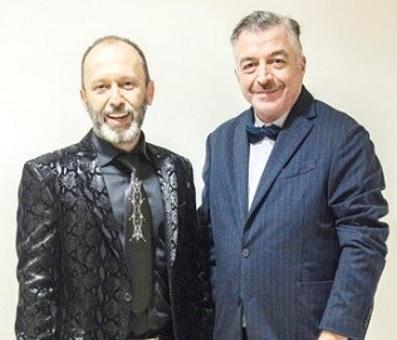
The coronavirus has drawn a very sharp line between the old and the new, and if the necessary measures are not taken, a second wave can wreak havoc on the entertainments sector, a founder of the management agency Pasion Turca said.
“As we cannot see the coronavirus, we cannot see the future very clearly as well. We need to analyze threats well and take quick actions. If a second wave of the pandemic hits and we do not take the necessary measures, it will be more destructive this time with permanent outcomes,” said Sinan Ufuk Nergis, one of the founders of Pasion Turca.
Pasion Turca, a Spanish company based in Madrid and Istanbul and established by Nergis and Vito Montaruli, has been in the market since 2000 and worked with many important artists from Loreena McKennitt to LP, Buika to Joan Baez, Cesaria Evora to Paco de Lucia, Monica Molina from Mariza, Nina Zilli to Natalie Cole, Lara Fabian to Despina Vandi.
Speaking to Hürriyet Daily News, Nergis and Montaruli talked about the new models for events after the COVID-19 pandemic era, digitalization and also future predictions about the music industry.
To what extent was the events sector affected by the coronavirus? Which subsectors were affected?
Nergis: In this period, of course, the organization sector has lost blood, like all sectors. Service sectors seem to recover later than production sectors. While an organization is being held, many sectors benefit from this.
Transportation, accommodation, food and beverage and logistics sectors collaborate in a unified manner. In other words, everyone we see around the concert area is a part of this chain.
A large proportion of the people affected are those who work on daily wages. When you look at the big picture, musicians and artists are only part of it so we will need the government support as in Europe regarding VAT, eliminating entertainment tax and reducing percentage of rights societies.
What kind of precautions were taken in Europe for culture and arts in the pandemic period?
Montaruli: In Spain, organizations have started being allowed by gradually increasing capacity in seated concerts; a maximum of 30 percent of capacity in indoor areas and 50 percent of capacity in outdoor venues.
On June 21, Spain will be open again, but still the precautions will be the same and audience capacity also will be the same at least until September 2020. The government will allocate 76.4 million aid and financing to the cultural sector.
What kind of a vision should the culture and arts sector have in this process globally?
Nergis: With controlled normalization, all the sectors including concerts organization are trying to return to their good old days under new measures, but if we want to play the game according to changing conditions and maintain our existence, we need to take action on time.

From SMEs to holdings, from International companies to Individual companies, those who adapt to the new norms will find a way to create and survive in the new era. We have to find new styles and ideas in this period along the way when we do our creations and productions.
What will be the “new normal” of the concerts during the pandemic in Turkey?
Nergis: According to “COVID-19 Outbreak Management and Study Guide” study of the [Health Ministry’s] Science Board in Turkey which was published on June 10, the decision was made to arrange that all the stages of ticketing should be done online as much as possible and with online sales option.
Wearing masks, intermittent seating, using barcode system during ticketing, taking the audience one at a time to the event area, avoiding physical contact as much as possible by using x-ray devices and hand-metal detectors in security searches are our new normal after COVID-19.
When compared to Turkey, how are digital projects organized in Europe?
Montaruli: Online concerts were organized more and in a larger scale. For example, dozens of Portuguese artists came together one and a half months before Turkish festivals, and awareness campaigns were done much earlier as well. The most important detail that stands out in here is “focusing on solutions.”
In Spain, a big online festival was organized on Instagram called “Yo me quedo en casa y Cuarentena” with biggest Spanish artists.
What steps is the sector taking in the name of digitalization?
Nergis: In this process, we have seriously experienced digitalization. Traditional culture and arts economics will turn into a digital economy. We will need to think more seriously about ways to continue with our organizations in digital media. While doing this, the technological infrastructure should be set in order to organize concert/organization for the audience without interruptions.
Our work should satisfy the user’s expectations. Maybe in the long run, we will begin to think about personalized entertainment concepts to meet the expectations.
What do you think about the attitude of the audience participating in the events in Europe after the pandemic experience?
Montaruli: Europe, especially Spain, is one of the regions affected the most by the pandemic. On the other hand, people also need to relax and enjoy in this period as well. I do not think there will be a problem about participation but under the current rules, there will not be a lot of activities with big crowds until September.
When do you think we will be able to see concert and festival crowds again in Turkey?
Nergis: Concerts without audience are now being organized. But the most important thing is not to forget to protect ourselves until the vaccine is found or this virus disappears. We bring world-famous names to the audience on digital projects. We made a digital concert with LP for a social platform in quarantine days and we are planning our evets within the framework of new rules.